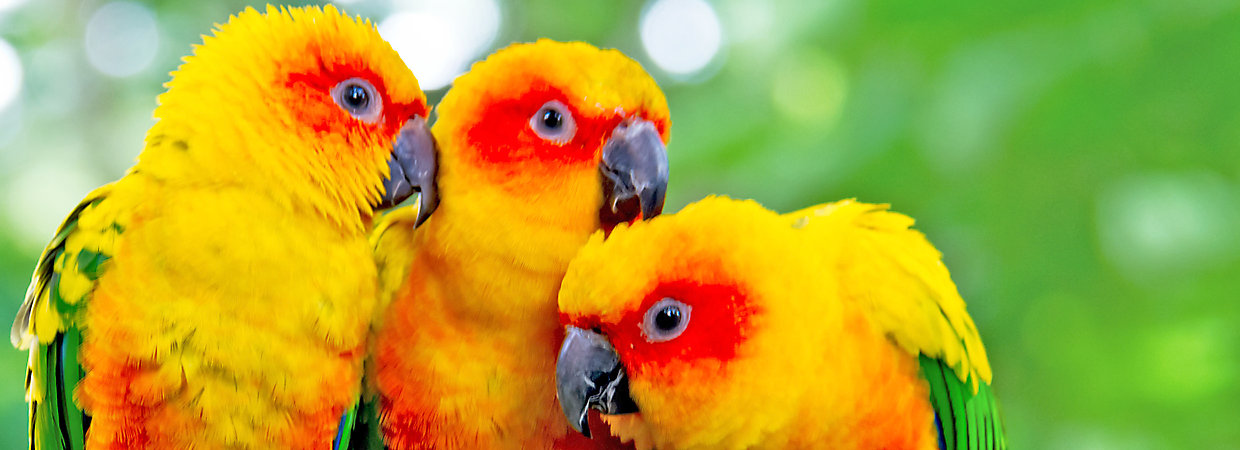Sign up, earn points, get treats
Conure Care Guide

In this Article
6 things to know about conures
- Experience Level: Intermediate
- Size: Most conures grow to about 15 inches (38 cm) long
- Lifespan: They can live 20 years or longer
- Temperament: Conures have playful personalities
- Behavior: They need at least two hours of daily interaction with their humans
- Origin: Conures are native to Central and South America
How do I set up my conure’s home?
- Keep conures in a cage large enough for them to stretch their wings, climb and play.
- Your conure’s cage should be 20 x 20 x 30 inches (51 x 51 x 76 cm) at minimum. The bigger the cage, the better.
- Provide at least 2 perches of different thickness and materials; the variation helps keep bird feet strong and healthy. The perches should also be placed at different heights.
- Don’t place perches over food or water dishes, because droppings will make a mess where your pet eats and drinks.
- Birds are sensitive to smoke, gases, strong smells and drafts. Keep the cage away from the kitchen and open windows, and out of direct sunlight.
- Line the enclosure floor with recycled-paper bedding or use a paper liner. Replace the liner at least every other day.
- Cover the cage at night
What do conures eat?
Conures enjoy a range of foods, including pellets, commercial birdseed, fruits and vegetables and occasional treats.
- Pellets should make up 80-85% of your conure's diet. Keep your bird’s food bowl three-quarters full and refresh it daily.
- Feed your conure dark, leafy greens, squash, berries, melons and other brightly colored fruits and vegetables.
- Offer birdseed as an occasional treat.
- Once a month, offer your bird wheat pasta and/or beans as a special treat.
- Conures can have access to a cuttlebone to help keep their beaks healthy.
- Your conure should have access to fresh, clean water at all times.
How can I play with and groom my conure?
- Conures are smart and sociable. With practice they can learn some tricks such as "step up" and "step down." They can even mimic human speech.
- Your conure will enjoy spending time outside of the cage every day. Provide a T-stand or playpen as a hangout. Do not use these stands outside.
- Inside the cage, keep your conure busy by rotating a number of toys to keep things new and exciting.
- 2 or 3 times a week, give your conure a bowl of warm water to use as a bath. Or mist your bird gently with warm water from a clean spray bottle.
How do I keep my conure healthy?
Try not to handle conures for 3 to 4 days after bringing them home to give them time to adjust.
Even a settled-in bird can feel sick. In addition to annual check-ups, talk to an avian veterinarian if you have questions about your bird’s health or if you notice any of these signs of illness or distress:
- Decreased appetite or weight loss
- Decreased activity or grooming
- Sleep and feathers fluffed up
- Long periods sitting at the bottom of the cage
- Sneezing
- Discharge from nose or mouth
- Change in droppings for more than 2 days
PET SAFETY TIPS
- Use caution when handling pets and remember they may bite or scratch (especially when stressed).
- Supervise children around pets.
- ALL ANIMALS can potentially carry viral, bacterial, fungal, and parasitic diseases contagious to humans.
- Thoroughly wash your hands with warm, soapy water before and after contact with any pet or its habitat.
- Adults should assist children with hand washing after contact with a pet, its habitat or aquarium water.
VET ASSURED™
Pets purchased at PetSmart are part of our exclusive Vet Assured™ program, designed by PetSmart veterinarians to help improve the health and well-being of our pets.
Our vendors meet a high standard in caring for pets and screening them for common illnesses. This program also includes specific standards for in-store pet care.
PETSMART PROMISE
If your pet becomes ill during the initial 14-day period, or if you’re not satisfied for any reason, PetSmart will gladly replace the pet or refund the purchase price.




